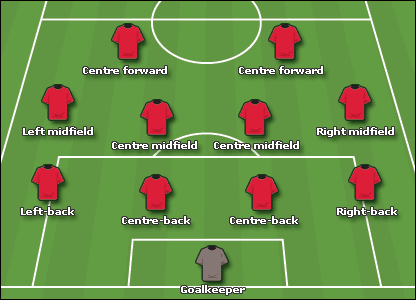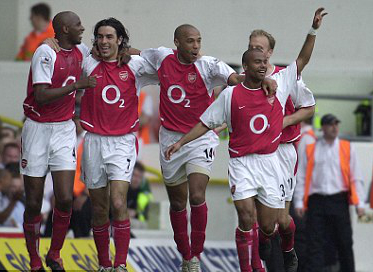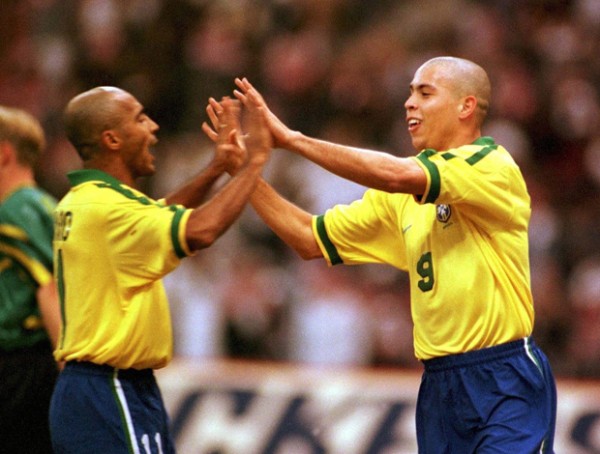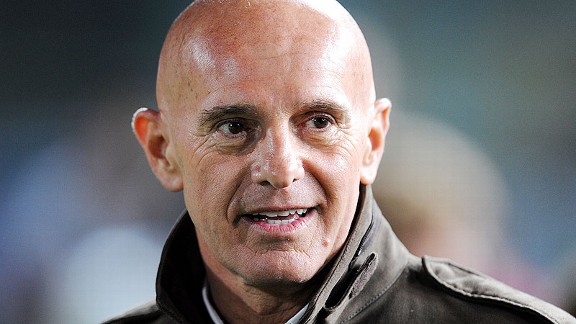

This is a guest post written by Johnny Peters, please give him feedback in the comments section. Also, if you want write and have your stuff published on FMS, read this and then contact us.
Johan Cruyff famously put the boot into the 4-4-2 formation when he said that teams should pass in triangles and not a straight line. His thinking was infectious, and since tactical trends tend to propagate downwards from successful clubs (see everyone’s Barca-induced obsession with possession-based football at the moment), the 4-2-3-1 of Mourinho and Heynckes and European football in general has overtaken it as the default.
These days, you’re more likely to hear the term 4-4-2 in a joke, perhaps alongside jumpers for goalposts, ‘getting stuck in’, or giving it to the big man. It has become synonymous with the long-ball, tactical shallowness, and an emphasis on physicality.
Cruyff was right — to a certain extent — but he spoke from the perspective of Barcelona, of Holland, and of his own Ajax team. All teams with exceptional players, teams which tend to have most of the possession, teams whose greatest problems are maximising the already-advantageous abilities of their superstar squads. If you have half a dozen of the world’s best forwards, and you expect to hammer teams week in, week out, then there are better options than 4-4-2.


In FM, 4-4-2 looks static because it is only a basis for a variety of movement. Instead of passes moving between slow players, the essence of the 4-4-2 are players moving constantly and intelligently around the ball. Think of Arsenal’s Invincibles. It is supposed to be a fluid formation, allowing players to roam.
There is no room for a singularly-focused ‘destroyer’ Makelele type in the midfield duo; it would make the team static in the middle of the pitch. Likewise, an overly attack-minded playmaker would leave the middle of the pitch uncontested. There is a balance to be struck here — not only with player selection, but with the players themselves.
Ferguson, one of the last, and greatest, promoters of 4-4-2 in the modern game said himself: ‘I don’t think we’ve had a holding player since I’ve been here. We’ve never had a holding player. We tried to get Roy Keane to do that but he just couldn’t do it. He had to play a way that was his own way of playing, so I’ve not had it for 25 years. Why should I think about it now?’
Similarly, it’s a common misconception that playing your speedy, dribbling wide player alongside central midfielders somehow blunts their potency by pulling them too far away from goal. The temptation being to place players whom you expect to score goals close to the goal, of course, but in doing so, you reduce the space into which that player can run into and make him a lot easier to mark.
Even the poster boy for the exciting wing forward Ronaldo, began his goal-ridden career as a winger under Ferguson’s 4-4-2. Actually look at the play of players like Ronaldo, Robben, and Hazard (at Lille) and you find that much of their success comes with mazy, pacy runs from deep out on the flanks. Contrast that with the 4-2-3-1 wing-forward, who must play with his back to goal predominantly and cannot use pace or skill to initiate attacks from the middle of the pitch.


Arguably the greatest loss since the demise of the 4-4-2 is the striking duo, however. (I’m including in that the two in a 4-4-1-1, as this is often how 4-4-2 translated on the pitch.) History is replete with variations on the ‘two up front’, the craft and pace of Henry and Bergkamp, the combative power of Sutton and Shearer, the intuitive trickery of Romario and Ronaldo, the telepathic Yorke and Cole, the list goes on and on. There is a clarity of purpose to having two strikers — scoring goals, and helping your co-striker score goals. Rarely did you see the kind of isolated, frustrated forwards in a 4-4-2 that has now become a common occurrence with single-striker formations (see the recent form of Torres, Giroud, Jelavic, Soldado, Cisse).
It’s a coincidental shame that the 4-4-2 was popular at the same time as English, and indeed many other, leagues went through a period of ugly, physical football, becoming culturally linked in an unfair and untrue way.
It is ironic that the 4-2-3-1 along with a fluid style has become the default for many FM players when it clearly separates attacking players from defensive, and even pre-ordains the pattern of play for them. 4-4-2 demanded a lot from each player, but also allowed them to fully express themselves. It did not limit them to specific tasks, taking away all other responsibilities in an overly controlled manner.
As the 4-4-2 using Arrigo Sacchi summed up perfectly: ‘Today’s football is about managing the characteristics of individuals and that’s why you see the proliferation of specialists, the individual has trumped the collective. But it’s a sign of weakness. It’s reactive, not pro-active.’


9 Comments
Leave a Reply
Отменить ответ
Leave a Reply
FM 2022 Latest
-






FM 2022
/ 3 года agoBest English Wonderkids in FM23 | 10 Must-Sign Players
Throughout the past 10 years, English football has seen it’s youth teams develop into...
-




FM 2022
/ 3 года agoBest FM23 Coaches — Football Manager 2023 Coaches By Category
The best FM23 coaches are vital to success and the full development of your...
-








FM 2022
/ 3 года agoGateshead to Glory Season 8 — The European Debut
Welcome to a new episode of my FM 2022 story managing Gateshead from Vanarama...
-








FM 2022
/ 4 года agoGateshead to Glory Season 7 — Second Year in the EPL
Hi, welcome to a new episode of my Football Manager story managing Gateshead from...
-








FM 2022
/ 4 года agoGateshead to Glory Season 6 — Premier League Debut
Hi, welcome to a new episode of my Football Manager story managing Gateshead from...
-
FM 2022
/ 4 года agoFootball Manager Lower League Tactic Back to Back Promotions
Welcome to this Football Manager lower league tactic guide. Intro: Hi, I’ve been playing...
Свежие записи
Subscribe to our Newsletter
FM 2022 Player Lists
-






FM 2022
/ 3 года agoBest English Wonderkids in FM23 | 10 Must-Sign Players
Throughout the past 10 years, English football has seen it’s youth teams develop into...
-




FM 2022
/ 4 года agoBest FM22 Turkish Wonderkids | Golden Generation of Talent
Who are the FM22 Turkish Wonderkids? We’ve searched through the database in Football Manager...
-




FM 2022
/ 4 года agoBest FM22 English Wonderkids | 10 Outstanding Talents to sign
Who are the FM22 English Wonderkids? We’ve searched through the Football Manager 2022 Database...
-




FM 2022
/ 4 года agoBest FM22 Vanarama National League North & South Free Agents
Football Manager 2022 is here, and below you will find the best FM22 Vanarama...
-




FM 2022
/ 4 года agoThe 11 Best FM22 Argentine Wonderkids
Who are the FM22 Argentine Wonderkids? We’ve searched through the Football Manager 2022 Database...
-




FM 2022
/ 4 года ago11 of the Best FM22 Brazilian Wonderkids
Who are the FM22 Brazilian Wonderkids? We’ve searched through the Football Manager 2022 Database...










pedrorizro roriz
15 октября, 2013 at 13:32
hello johnny! i have respect for your opinion. i like to see intelligent people discussing tactics; i’m quite a tactic freek myself.
however, i don’t agree with you. i don’t disagree completely either. i believe 4-2-3-1 creates a barrier between attacking and defending, just like you said. you specialize your players to the point that it is almost obvious that your center forward will be your top scorer, your wingers will be your top assistants, your right/left backs will be of second importance and your goalkepper will always throw the ball for far distances. you can change de players, but it will eventually get to those premisses.
but, about 442, for too long has england shown us that players, specially in the middle, won´t have enough space to express themselves in their roles completely because they will be tightened between wingers (and therefore won´t be able to flank anyone), wingers will be reduced to moving upwards and downwards the pitch because midfielders will compress them to the line, and fullbacks will have to watch out when to overlay because they might risk crowding the middle if they are not fast when moving past the wingers (remember danny mills?). it happened to such an extent that here in brazil we adopted a 4-2-2-2 strategy in order to uncrowd the wings, leaving huge avenues to roberto carlos’s and cafu’s fast cars to pass frantic through the middle, whilst we had two good playmakers roaming in the middle. and with that strategy we won 2 worldcups.
i don´t believe there is the best tactic to be followed anywhere. tiki-taka works perfectly when you are a enormous club facing little opposition in your domestic league and keeping players fresh for europe. but, if you play in such a tactical league as the italian league, allowing 5/6/7 players to roam forward, trying to press high up the field, well.. your asking to be put to sleep by tactical counters, long balls and positioning. internazionale beat barcelona that way, a couple of years ago and so did milan. so i really think there is better strategies depending on the league you are in.
hasn’t juventus conquered italy in an old fashioned 3-5-2/5-3-2? :c)
Johnny Peters
15 октября, 2013 at 13:46
I absolutely agree with you that various tactics can be used for different purposes, I was only trying to bring some of the credibility back to the 4-4-2 as I think it has garnered an unjustified association with bad football.
I disagree however with the idea it somehow forces the midfield to be crowded. If anything, I think we’re seeing the centre of the pitch become crowded with formations like the 4-2-3-1 and 4-3-3. In the Premiership, big teams like City can come undone against even small teams due to a lack of width. 4 across the midfield I think is the perfect number and allows each a good amount of space, even more if you have intelligent players who can interchange and move vertically in a smart way.
In practice, I feel the 4-4-2 is always a little asymmetrical, and that wingers (who are often quicker players) will always find themselves a little in front of the central two. That wide space in your opponent’s half is where most goals are initiated (I wish I had the stats to hand, but I am certain they would bear this out). It makes sense to me to have players focusing on those areas, even if they will not find themselves in front of the goal often. If only we could all play with Brazilian playmakers and full-backs, we wouldn’t need to exploit this weakness!
pedro roriz
15 октября, 2013 at 14:06
hahaha good point!
i remember when vanderlei luxemburgo, a brazilian coach, when to madrid to be real madrid’s coach. he got sacked 9 months later, but in his time there he was the manager with most points scored in la liga. i remember when he got back to brazil and was treated as a celebrity. it is not often for us to see a brazilian succeeding in the touchline and not in the field in europe. Big Phil, or Felipão, is another good example. well, back to luxemburgo, he was interviewed by globoesporte and the journalist asked him what did he do to beckham because he was borned again under the coach’s spell and he said something like «he was the best passer i had in the team, better than zidane. spanish teams tend to mark tight in the middle but are sloppy in the sides. so, i created a 4-4-2 with no fast wingers, but with good passers. zidane or julio baptista (remember him?) was out left and beckham was player wide right, having much more space to do what he does best: creating havoc with through passes.» i don’t remember the stats anymore, but the screen showed us that beckham had something like a 96% passing ratio and more than 150 passes through out the game. that is unbelievable high.
i just don’t feel that 4-4-2 has that knock-out power. beating montenegro as england did is really nice, but if you grab their recent results, i think that could be the exception. maybe if you have one or two twicks to perform, like luxemburgo did, you could come up with some surprises. and that was what we talked about: adapting tactics to the league you are in; something we both agreed on.
but anyway, nice review my friend! hope to reading more from your again!
Andy
16 октября, 2013 at 16:04
Hasn’t England started to play an 4-2-3-1? According to http://www.whoscored.com/Matches/565950/Live/International-FIFA-World-Cup-2012-2013-England-Poland, they did. There seem to be a lot of teams that plays tactics that seem to be a blend of 4-4-2 and 4-2-3-1, like Man Utd and Man City with both Rooney and Agüero as the second striker. The 4-2-3-1 seem to be more of a 4-4-2 when a striker is played in the AMC instead of an traditional advanced playmaker.
Matt
15 октября, 2013 at 18:43
The best thing about the 442 is the wing play. Combining this with two strong strikers and it becomes deadly. As for your point about the holding midfielder, I like to use a energetic ball winning midfielder in the centre of park such as Roy Keane. Alongside a deep lying playmaker, such as Carrick, it makes for a good partnership.
MRDNRA
15 октября, 2013 at 18:50
I occasionally use 4-4-2 on FM, although I find there are often other formations with 2 strikers up front can be successful too. In fact probably the game I used 4-4-2 most in was FM11 when what started off as a single club save with Leicester, where I started using 4-4-2 with AMR and AML rather than standard MR and ML, became a two club save once after several seasons (about 15 seasons I think!) I saw that Celtic’s manager had been sacked (they were 8th in the SPL about half way through the season!) so created another manager and used 4-4-2 to great effect there. By that time with Leicester though I had switched to a 4-1-2-1-2! Which is coincidentally what I’ve also ended up doing in FM13, ending up with 4-1-2-1-2 again! I’ll see in FM14 though if I can create an effective 4-4-2 (my usual player roles for the central midfielders are having a ball winning midfielder and a playmaker, though I will change them from time to time!)
Darren
15 октября, 2013 at 19:02
Very nice article Johnny, that was a great read. I can see your points and its a nice spin on the 4-4-2 that, as you said, has received many negative reviews through recent history. I personally love the 4-3-2-1 (the two been AMR and AML) because I always find that three MC’s working correctly can deal with almost any scenario. However, I do see what you mean, the 4-4-2 doesn’t have to be this rigid, direct, bullish style of tactic, it can be just as fluid and create just as many triangles as any formation.
I always say the mark of a good article is one that inspires someone to think, or do differently then they would that same day before reading it. I now really miss the idea of a Cole/Yorke partnership or Shearer/Sutton from back in the good old days. Back in a time where two men could form a relationship that led to 40+ goals combined in a season. I may well consider seeking that with fluid Football come the new game, we’ll see…that may not be the intended reaction you were looking for with your writing but still a change in my usual thoughts. :)
saltwater
16 октября, 2013 at 07:43
Really nice article there, mate. I completely agree with you about sadness with the disappearing striking partnership. And now as a result all we have is frustrated single strikers that you actually forget are suppose to be the star player of the team. I too dislike this negative spin put on the 4-4-2 as though it’s only for primitive managers with no imagination. Brendan Rodgers seems to have overcome this problem with his makeshift 3-5-2. Still can get 3 men in the center of midfield but then still two up top. For years my FM experience has been frustrating as I’ve tried to solve that same problem, as sadly playing on two central midfielders does leave you feeling slightly exposed. I’ve come up with a narrow 4-1-2-1-2 which is doing a good job thus far.
Overall great article mate looking forward to hopefully another one.
Football mentalist
19 октября, 2013 at 16:06
Nice article, as you say the player instructions make the formation in the end. You can start of with a 4-4-2 but if you make the right player instructions it will be a 4-2-3-1 formation in field. I do think though that the midfield is where most games are won. So as long as you can make a balanced midfield it doesn’t matter what tactic you play. There is no ultimate tactic, nore are there ultimate players. it’s always a team effort and finding the right balance in the team is what coaching is really all about. Different team? Different aproach. the players make the team, the coach needs to guide the proces. A man can win everything with 4-4-2 or 4-2-3-1 it doesn’t really matter as long as he fits with the team and knows how to guide his team. I’ve won the game with so many different tactics that I don’t really care for wich tactic I choose I make it depend on the players I have. But it’s a nice to see someone try to defend a tactic in wich he believes. It just shows how people love the tactics part of the game though in the end it’s just a tool, one of the many tools there are.